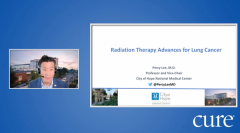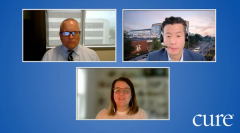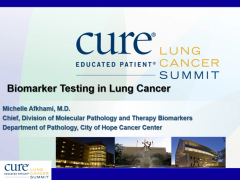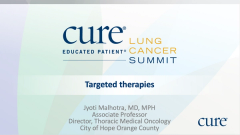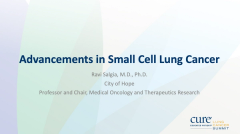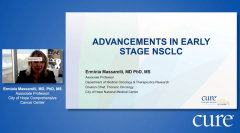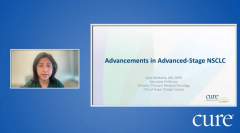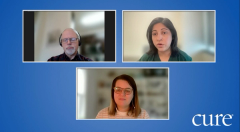
Educated Patient® Lung Cancer Summit Targeted Therapies Presentation: April 29, 2023
Watch Dr. Jyoti Malhotra, from City of Hope Orange County, discuss targeted therapy, during the CURE® Educated Patient® Lung Cancer Summit.
Episodes in this series

With new developments constantly happening in the field of targeted therapies for patients with lung cancer, it’s up to patients to make sure they are receiving up-to-date care precision care, according to Dr. Jyoti Malhotra.
“There are a lot of new treatments targeting mutations in the tumor (that) have been approved, but the key point here is that every patient who is diagnosed with lung cancer needs to get a whole panel of mutation testing on the tumor,” Malhotra, associate professor in the Department of Medical Oncology and Therapeutics Research and director of thoracic medical oncology for City of Hope Orange County, told CURE®.
Specific, mutated genes and proteins that help cancer cells survive and grow are targeted by drugs known as targeted therapies, Malhotra explained during the CURE® Educated Patient® Lung Cancer Summit.
“The field of lung cancer treatment has really transitioned,” Malhotra told CURE®. “Now it's all about precision medicine, meaning it's all about understanding each patient's tumor, and know(ing) precisely what changes have happened in that patient's tumor so that we can tailor our treatments not for lung cancer in general, but (for) what every patient's tumor has, and be very precise in our treatment approach.”
Malhotra advises patients to try to get the workup analysis of their cancer finished as soon as possible, so that treatment can be started quickly, and to receive a thorough assessment of their disease and tumor using sequencing and genetic testing. Then, she said, patients should seek expert opinions and consider enrolling in a clinical trial for access to novel treatments.
“It's very important to be an advocate for yourself, asking for better treatments, starting treatment quickly and learning as much about the tumor as possible,” she said.
Erlotinib – an epidermal growth factor receptor type 1/epidermal growth factor receptor (HER1/EGFR) tyrosine kinase inhibitor – made waves when it was approved by the Food and Drug Administration to treat locally advanced or metastatic non-small-cell lung cancer in 2004.
“That was really the first time when we started seeing these great responses with using targeted therapy,” Malhotra said.
Targeted therapies have been on the table for nearly 20 years, but their growth has expanded rapidly more recently.
“In the last five years or so this has really accelerated,” she said. “Because in the first 15 years … maybe there were two different types or groups of targeted therapies approved. But in the last five years, there are more than eight to 10 different targets for which appropriate treatments are now approved and more to come within the next year.”
What was the driver behind that rapid expansion?
“It was really about awareness as we started seeing the improvement in outcomes, because targeted treatments are better than the other standard-of-care treatment options such as chemotherapy, they have fewer side effects, (are) better tolerated, have longer and more durable clinical benefit,” Malhotra said. “And as molecular testing is getting more and more accessible to patients, we are seeing more and more patients using these treatments, and which has made a significant improvement. The overall survival from lung cancer has gone up in the last decade, which is very encouraging.”
For more news on cancer updates, research and education, don’t forget to

